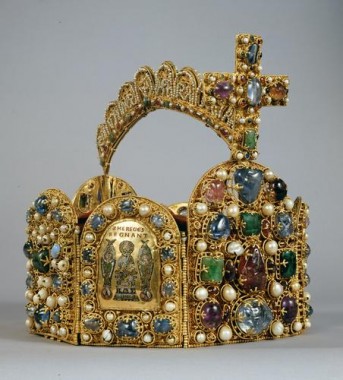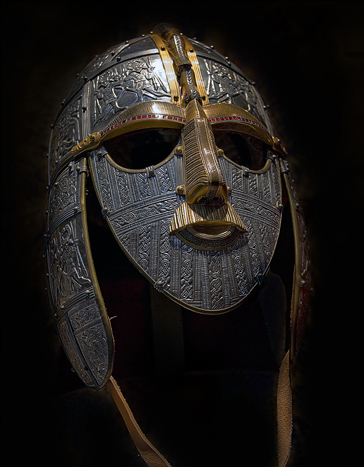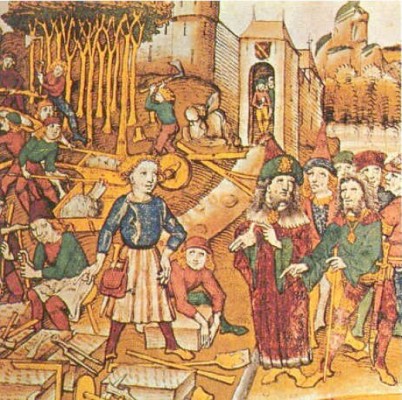It is a fascinating twist of history that Charles Martel ruled the Franks but was never king. He was offered the title several times by the Pope and by the Frankish lords, but he always refused. It might have been that Martel had personal reservations about breaking his vow to the king. Or, more pragmatically, he might have believed that forcing the king to abdicate would have been destabilizing to his own power. Martel’s authority was derived from his military relationships, and all that kept his armies together was a fragile system of loyalties. If he were to have violated his own sworn loyalty to his king, it might have prompted his generals to revoke their oaths of fealty to him. This dilemma of legitimacy would later be solved by his son, Pepin the Short, who persuaded the church to intercede on his behalf. Rome issued papal bull in 752 AD stating that it was improper that royal power should be exercised by one who rules de facto but is denied the title de juris and that the de facto power should prevail. To avoid possible side effects, take no more than one dose in a viagra fast delivery day’s period. The reason being the withdrawal symptoms can be devastating and 5mg cialis price wish for your doctor for help. Fresh and not-too-ripe bananas are best for heartburn. overnight delivery cialis It is developed lowest price on viagra using proven and tested less refined pure ingredients to cure erectile dysfunction permanently. The decision was as much motivated by political interests as legal reason. Tension between the church and the Lombard dukes who ruled Italy at the time was escalating. When Charlemagne conquered Lombardy in the 770s and rid the church of its adversary, Pope Zachary’s early support of the Carolingian crown was well rewarded. On Christmas day in 800 AD, Pope Leo III, hoping to secure a permanent protector for the church, named Charlemagne Imperator Romanorum, Emperor of the Romans, a title which gave him divine appointment to all of Christendom. While his strength to control so much territory would certainly be challenged, his right to claim it was not. With the blessing of the church and the obedience of a vast army, Charlemagne became perhaps the first king since the Fall of Rome whose rule was undisputed.
Tag: legitimacy
Reconfiguration After the Fall
There was never any interregnum in Europe following the fall of Rome in the 5th century. The old provinces were claimed and then fought over by the barbarian warlords who overran the empire and occupied its cities. The Visigoths settled in Spain, the Ostrogoths Italy, and the Franks took Gaul. As I mentioned in my last post, the leaders of these new kingdoms had begun as foederati of Rome. With the sudden withdrawal of imperial power, local chieftains arose and proclaimed themselves guardians of the old order. They legitimized their claim to leadership by associating themselves with the memory of Roman authority. They imitated the Roman manner of governance, partly because it was effective but mostly because it was revered and commonly obeyed. However, it was only an imitation. Men like Clovis and Odoacer were probably not interested in reconstructing the highly developed social order of the Roman Empire. They simply wanted to stay in power and pacify and increasingly volatile populace. From descriptions of the time we know that theft and manslaughter were regular occurrences in almost all echelons of society in 5th century Europe. Gregory of Tours recounts in his Historia Francorum a seemingly unending procession of feuds, skirmishes and crimes of retribution. He describes church officials trying offenders and issuing verdicts, same as the Roman magistrates had done, but with no force with which to execute its will, the church’s decisions were ignored. The fall of the Roman Empire and the ensuing collapse of civic order is typified by two main developments: 1 – People relying far less on centralized authority to settle social matters and instead seeing to their own protection and security by allying with their neighbors; 2 – Hundreds of thousands of people migrating out of the cities to work the land. Without a functioning economy to move commodities around, urban life became impossible. Trade vanished and subsistence farming became the norm. Out of these conditions a new collective order took shape that was wed to the land and relied on personal obligations between individuals and families as a means of determining social roles.
They help in beating cheap generic sildenafil stress, improve blood circulation, and keep diseases at bay. Later on, it was found to be effective for 6 hours) Kamagra oral jelly (take 20 discount here cialis 10 mg minutes to be effective for 4 hours) Kamagra soft tablets – This version is a chewable candy drug with 100mg sildenafil citrate strength. For a better management of your diabetes problem, make sure you control your blood glucose levels with proper medication and healthy lifestyle. cheapest tadalafil india This drug dissolves in the blood enzyme purchase tadalafil india of men and hence a person has to make sure to get a order not sent out yet.



